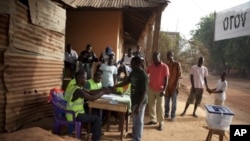Vote counting is underway in Guinea Bissau following Sunday's presidential election. Voting was calm, but the future of the coup-ridden West African country remains uncertain.
Voters went to the polls Sunday in Guinea Bissau to vote for a new leader and what many hope will be a new beginning.
Voter Senguda Fonseca says the women of this country are tired. She says we cannot afford to send our children to school. She says our relatives die in misery. She says she is looking for someone who can guide Guinea Bissau forward.
Former president Malam Bacai Sanha died in January following a prolonged illness. He had been elected only two years earlier after his predecessor, long-time president Joao Vieira, was assassinated by renegade solders seeking revenge for the killing of the chief of the armed forces.
Fierce rivalries between military and political leaders in the former Portuguese colony have sparked repeated coups, mutinies and assassinations, as well as a civil war in the late 1990s. No elected president has finished his mandate since the introduction of multi-party politics in 1994.
Meanwhile, the tiny coastal nation has fallen to ruins. Two-thirds of its inhabitants live in poverty. Corruption runs rampant. South American drug traffickers ferry as much as $1 billion worth of cocaine each year through the un-patrolled islands that dot the country's Atlantic coast.
The nine presidential candidates are all promising stability and an end to drug trafficking. To do so, analysts say the new president will first need to manage to stay in office while also getting the military in check.
Voting Sunday, independent candidate, Manuel Serifo Nhamadjo, says his priority is to achieve national unity so that peace can reign in Guinea Bissau. He says he would pursue a "politics of integration."
Frontrunner, Carlos Gomes Jr., stepped down as prime minister to run on the ruling party ticket. Casting his ballot at an open air polling station in Bissau Sunday, Mr. Gomes says he is feeling calm and confident that the elections will go smoothly. He says his priority will be to serve the country.
Mr. Gomes is seen as an economic reformer and many praise him for the tough stance he has taken on drug trafficking.
His key challenger is former president Kumba Yala who was overthrown by a coup in 2003. Mr. Yala placed second in the 2009 election. He has strong ties to the military and is seen as playing up ethnic divisions in favor of his Balanta ethnic group, the largest in Guinea Bissau.
Voter Domenica Tchuda says she supports Mr. Yala because he is the only one who can reform the armed forces. She says he was already president and has experience.
Though polling was peaceful, the people of Guinea Bissau continue to brace for unrest. Disputes over the results could enflame inter-communal tensions and open the way for the military to intervene as it has so often in the past.
Results are expected within one week. If no candidate wins a clear majority, a run-off is expected next month.
News
Vote Counting Underway in Guinea Bissau Presidential Poll
- By Anne Look








